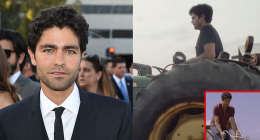
[This interview contains spoilers for Dune.]
Among the most striking qualities of Denis Villeneuve’s sweeping sci-fi epic Dune is its almost overwhelming sense of scale. Shot on Imax, the film’s creation involved sets the size of two football fields and weeks of production in Jordan’s vast Wadi Rum valley, best known as the principal desert location of Lawrence of Arabia. And when the sci-fi aristocrats at the story’s core announce they are changing homes, they decamp to an entirely new planet, not just another castle or continent.
Amidst all of the interplanetary grandeur, though, Dune‘s drama centers on that humblest of narrative units: the nuclear family. It’s the quiet moments between parent and child that generate much of the film’s poignant drama, even as the fly-overs of alien worlds and spectacular set-pieces deliver Villeneuve’s signature brand of immersive awe.
“When one looks at the story of the book and the film, it’s an archetypal family dynamic — mother, son, father,” says Dune‘s star Timothée Chalamet. “As a narrative centering of a really big piece like this — independent of the fact that it’s science fiction — that’s rare. So the fact that I got to explore that with Rebecca Ferguson and Oscar Isaac was a great joy.”
Chalamet stars in Dune as Paul Atreides, the adolescent son of Duke Leto (Isaac), head of House Atreides, which has been tasked by the emperor of the known universe with taking over leadership of the forbidding desert planet of Arrakis. Paul’s mother, Lady Jessica (Ferguson), is both the Duke’s loyal concubine and a member of the Bene Gesserit, a secretive sisterhood that wields political and supernatural power.
Lady Jessica’s dual allegiances are given visceral expression in a taut and stunning turn from Ferguson, while Isaac’s Duke possesses all of the palpable integrity of the character as originally written by Frank Herbert in his seminal 1975 novel. It could be argued, though, that Isaac brings a new layer of humanism to his portrayal — particularly in his quieter scenes with Chalamet.
“Letting Paul’s freeform affection welcome his dad, and building that with Oscar, was so easy,” says Chalamet. “I have huge admiration and respect for him as an actor — I think of that graveyard scene, and some of the others.”
In the graveyard scene, which comes in the first act, the Duke and Paul are strolling together amid their ancestors’ tombs as they prepare to leave their home planet of Caladan behind. Nervous about the move and all that it may portend, Paul turns to his father and asks, “Dad, what if I’m not the future of House Atreides?” Oscar’s Duke replies by telling his son what his own father had told him — “A great man does not seek to lead, he’s called to it.” — but he also adds: “But if your answer is no, you’ll still be the only thing I ever needed you to be… my son.”
Remembering back to the creation of the scene with Villeneuve, Issac says the intention was to buck the usual tropes of dynastic action movies. “This idea came up of having the Duke accept his son in whatever capacity,” Isaac explains, “because usually, the cliche is, ‘I’m building you into the leader I need you to be!’
“Instead, what you get,” Isaac says, “is him saying, ‘Hey, I get it. I understand if it feels like too much, and maybe it will be, and that’s okay. But if there’s something in you that can do it, know that I’m here to support you and I’m going to teach you everything that I know.’ I just thought that was a beautiful distillation of things that are implied in the book, but not said at all directly.”
Isaac also credits the emotional effectiveness of the scene — which can’t really be captured in text, of course — to Chalamet’s uncommon sensitivity. “He has an amazing awareness of everything that’s going on around him, of everything that the other actor across from him is doing,” Issac says. “I think that’s why he’s so compelling to watch because he’s taking it all in and he’s not just doing some idea in his head of what he’s supposed to be doing — he’s just really there; he’s so present.”
Breaking down the scene further, Isaac adds: “I’m only about 15 years older than him, and yet he really allowed himself to go to that place to have that dynamic of me being his father figure — and that’s something that needs to come from him. I can try to give off dad vibes as much as I want, but it’s that old acting adage that it’s the court that tells everybody who the king is, not the king. How the court treats the person of higher status tells you everything you need to know about them.”
Isaac continues: “So that was all on Timothée — and he really gets there in that beautiful graveyard scene. His reactions are what make it all happen. You really feel like this is his dad and you get that warmth — and I just loved that. We had so much fun.”
“On the day, it was just a great joy,” Chalamet remembers. “It was a great honor to work with Oscar, and he’s someone I now consider a friend in my real life, but when the camera came on, it did feel very paternal — and luckily so, because he’s a great guy.”
Source: HollyWood








